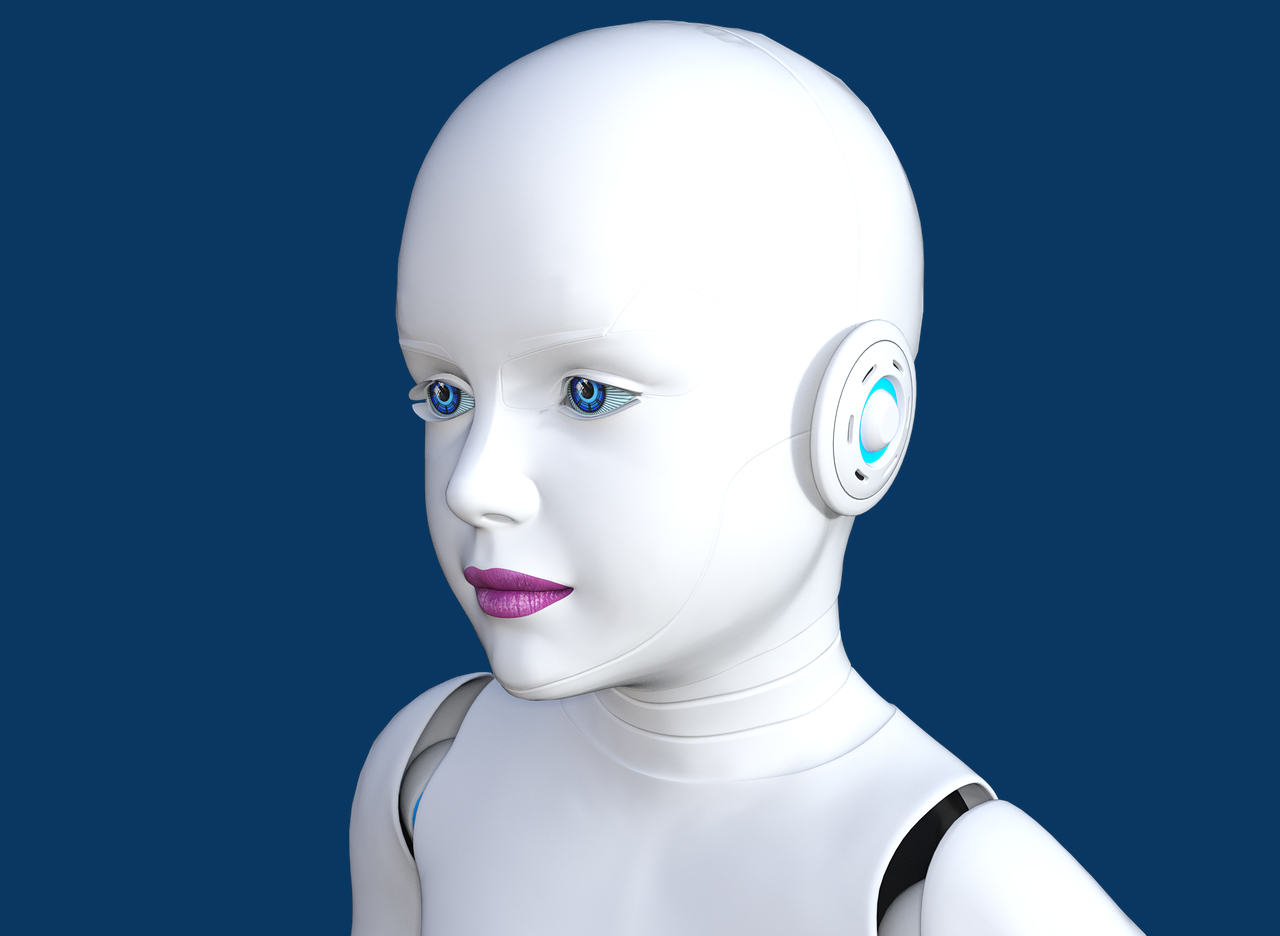Minyoung Lee
Her morning routine for the last four hundred years: Unplug herself from bed. Check if her organs have enough battery for the day. Pay her respects to those who have died in front of her home altar. A stick of incense for her mother. A freshly cut flower for her daughter. A burning cigarette for her late, late uncle. She hopes when she joins them, someone would light a jasmine-scented candle for her, though who that would be she is unsure.
Her biannual physical. She sits on the tissue paper that wrinkles every time she moves. Stainless steel. White. Chill. Unknown devices on the wall. Beeping. Biohazard. Alcohol. Kills 99.99% of germs. Plugs. Numbers. Lights. Plastic gown sticking to her artificial skin. She folds a corner of the brochure wrinkled in her fist. The glossy paper frayed around the edges, exposing brown cardstock underneath. Maybe this time they’ll let her. Maybe this is the time.
The Doctor walks in, plugs a probe into the small socket implanted on her arm, checks her vitals. All normal, all good. Will check you again in six months. But wait, she says. She hands the Doctor the folded brochure. Please, I think it’s time.
We talked about this before, the Doctor says. We can keep you alive and healthy without resorting to robotics. Your prescription organs will last you a few hundred more years, as long as you maintain them well, take care of yourself.
I’m too alive to become a robot?
Not enough damage.
You’ve said that before.
You’ll prefer staying human. Trust me.
The Doctor steps away, tossing the brochure into the recycling bin. The tissue paper tears as she hops off the exam table.
Her friends don’t understand why she wants to become a robot so soon. Enjoy your time, life is short, you’re still young. No one knows what it feels like to be a robot, they say. No robot has been able to tell us what it’s like.
Maybe they don’t feel anything, she says.
And who would want that?
She wanted it two hundred years ago, when she was hit by a car, a hit-and-run by some guy who drove around those vintage Japanese sedans because he “loved to drive” and being shipped around in self-driving cars “wasn’t really driving.” The police, the EMTs, the insurance agent, no one believed anyone could be hit by a car in this day and age.
What are the chances? They said. How does it feel?
When she woke up in the emergency room the first thing she saw was the texture of the off-white paint on the ceiling, something she hadn’t seen for decades.
We noticed you hadn’t corrected your vision yet, the Doctor said. So we went ahead and replaced your corneas while you were under.
She wanted to sit up. A shock through her spine.
Don’t move yet, the Doctor said. Your organs still need charging before you move. Extensive surgery, unusual injury, but in the end, it was rather simple.
She slept for most of the following days, waking up only to eat thin porridge, and occasionally roused by a class of medical students coming in to observe her case. The patient was hit by a moving vehicle driven by a human, they said. Rare treat, hard to come by, the last record of this was in the twenty-second century. Why wasn’t she turned into a robot? A student asks. She was still alive, the Attending says.
Why wasn’t I turned into a robot? She asks her Doctor.
Not enough damage, the Doctor says.
Her third husband was turned into a robot a few years after their daughter died. She went in her sleep—Sudden Infant Death Syndrome. Either that or the cat stole her breath away, as her mother-in-law liked to say, reminding her they should have gotten rid of the cat as soon as she learned about her pregnancy. The Doctors said his grief was too much to bear; he’d die of a broken heart anyways. The humane option was to rid him of pain. Then her robot husband left her in the middle of the night, as robots often do.
His side of the bed still smells like musk and motor oil.
She keeps a bar of milk chocolate in the fridge for this man. It would have been her offering to him at the altar if she could convince herself he’d actually died. But she wasn’t sure and it didn’t seem proper to provide offerings to someone who might still be alive.
Grief is something she feels she knows well, even though she is unable to convince any Doctor of this. After her seventh miscarriage, she wanted her uterus removed to save her from further grief, a simple procedure, recovery within a day. But she couldn’t find a Doctor in the city who would do it for her. You just divorced your second husband, you’re still single. You’re still young and will want to marry again. You’ll want children with your new husband, they said.
That child survived her dessicated womb but couldn’t survive a cat’s whiskers.
# # #
She takes a detour on her way home, along the crowded sidewalks smothered between glass highrises. Her favorite florist has a small store on the corner. Her daughter will appreciate fresh daffodils on the altar tomorrow morning. Flowers for her birthday. Flowers for her death day. It doesn’t matter. It happened hundreds of years ago, as if it just happened this morning.
Display windows flash at her, craving her attention. She cranes her neck to look behind them—faceless white mannequins dressed in green silk and artificial fur, shiny leather bags trimmed with red satin. A young woman reflected in the glass, mid-to-late-thirties, though nobody knows anyone’s age anymore. She takes a moment to consider that this woman is her, a reflection she doesn’t recognize, since she doesn’t even reflect the woman she had been four hundred years ago. Where did all the grief go. Where did all the deaths. This woman’s lips still plump and rosy as if she never kissed a dying infant, hungrily sucked back a cruel lover, smiled as they cremated the last person who knew her as a child.
She walks inside the store. Stands on the escalator. Slick black plastic. Glass chandeliers. Circulated air thick with patchouli and bergamot, plants that went extinct decades ago. The mannequins dressed in the new season’s fashion, bright and colorful, the same as five years ago, a decade ago, two decades ago, going back hundreds of years. Women’s, girls’, boys’, men’s, sports, lingerie, home goods on the top floor. She steps off and sits on the first bed she sees. Sinks in the mattress, unsure of its comfort.
Mattresses haven’t changed much in recent centuries.
She heads over to the viewing deck, a special feature of this department store. The tallest building in the city, owned by a national conglomerate with stores in every mid-to-large city, identical to almost any other store from this chain. Tourists still love the idea of being on the top of the world. They seek out this deck to feel powerless. Robots don’t need to feel powerless. Robots don’t need to feel comfort. Robots don’t even need a candle lit for their altars. There’s no one left to light candles anyways.
A windy day. Few people on deck. She finds a spot on the ledge. So trusting, she says, looking down. So dear.
Damage. Not enough damage.
She lets her body fall.
# # #
Wind.
# # #
Stainless steel. White. Chill. Unknown devices on the wall. Beeping. Biohazard. Alcohol. Kills 99.99% of germs. Plugs. Numbers. Lights. Plastic gown sticking to her artificial skin.
You were lucky, they say. You landed on a crowded street. Enough people to see you fall. Called an ambulance right away.
The pain. The pain.
She laughs and laughs. Pain so strong she can barely feel the grief.
We can increase the painkillers for you. You’ll feel better soon.
The Doctor laughs, humored by her confusion.
Tons of work to bring you back. Teams of Doctors. The latest technology. Almost resorted to robotics. But you made it through. We’re proud. Very proud.
She studies her arms, a plastic tube pierced through her socket, feeding her vein. Supple skin that knows no discomfort. She touches the protruding vein underneath it, feels her pulse.
Minyoung Lee lives in San Francisco, CA with her well-traveled calico cat, Matisse. Her work appears in MoonPark Review, Vestal Review, JMWW, and others. Minyoung is a Tin House Summer Workshop Alum and a Fear No Lit Submerging Writer Fellow. Her website is https://myleeis.com/. Follow her on Twitter at @minyoungleeis.


